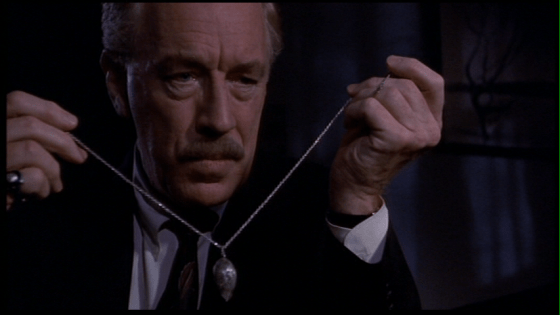
Needful Things: C-
Socrates: Glaucon, have you come across a movie based on a Stephen King novel that involves haunted antiques?
Glaucon: Yes, Socrates, I am familiar with it. How could I not be?! This movie has been parodied extensively, to the point where one might feel acquainted with it even without having seen the movie or read the book Needful Things. I cannot stand this movie! I give it a D-!
Socrates: Having never seen the film, I believe it deserves a B+.
Glaucon: Absurd! How can you be so confident in your grading without having seen the film, Socrates?! Do you expect me to believe –
Socrates: First answer this: Could it be said that the movie suffers from a forced familiarity that arises from the actors within it having been typecast repeatedly in the 90s? Thus, one might anticipate their actions throughout the film? For example, does Max von Sydow assume the role of a mysterious outsider with a uniquely commanding yet restrained menacing presence? And does Ed Harris portray an everyman hero delivering powerful monologues with visible signs of intense emotion and pulsing neck veins?
Glaucon: They do, Socrates.
Socrates: And does the actress who plays Honey Bunny from Pulp Fiction exhibit explosively violent tendencies, while the actor who plays the mayor from Pleasantville portrays an unscrupulous local politician?
Glaucon: Indeed, Socrates. The movie’s predictability is largely derived from the actors’ past performances and roles. Moreover, the movie’s production and acting are quite subpar, and the runtime is 120 minutes, creating a massive endurance challenge for the audience!
Socrates: Ah, I see. With the multitude of predictable characters within the movie, does it become difficult to genuinely empathize with the central conflict, their plight when faced with the malevolent actions of Max von Sydow’s character?
Glaucon. Yes, Socrates! Curious too that he admits to deriving pleasure from instigating conflicts throughout history, which have resulted in some of the most notorious and blood-soaked atrocities! Why then has he suddenly opted to employ a magic thrift shop to torment and kill a select few losers in Maine? It just feels a little too Stephen King!
Socrates: Interesting, Glaucon. But despite your overall critique of the acting, would you say this film still contains a commendable performance by Max von Sydow, considering the circumstances? Does Sydow skillfully transition between the roles of a friendly Swedish grandfather and a malevolent figure selling evil antiques? I imagine that the script’s inclusion of woeful puns would pose a challenge for anyone to maintain a composed countenance during filming.
Glaucon: Certainly, Socrates. I will concede that his performance was well done considering the circumstances. But, I thought you said you haven’t seen –
Socrates: Glaucon, I think you will soon see the fault in your logic. Your high standards for acting are commendable even if they lack conviction and easily crumble when I ask a single question! Also, your critiques of familiarity and length are problematic. Might there be room for enjoyment in indulging in simpler pleasures? Even if the film lacks excellence, it still manages to offer a degree of entertainment value, does it not? You yourself just gushed obscenely at the acting prowess of Max Von Sydow!
Glaucon: I just said his performance was commendable under the circumstances! I struggle to find merit in celebrating mediocrity, Socrates. This is not how we create a just society!
Socrates: Length and character predictability can indeed hinder our ability to engage fully with a story. Yet, might we consider the possibility that the filmmakers intended to create a highly predictable film, tapping into the stability we crave from life itself? Could it be that the clockwork cast and seemingly unnecessary sprawling scenes serve a purpose beyond immediate comprehension? Should you perhaps wait longer than 15 minutes after a movie ends to condemn it?
Glaucon: Your perspective gives me pause, Socrates. Perhaps I have been too hasty in my judgment. However, I still maintain that cinema should strive for greatness: Great acting with great casting, great writing with great structure.
Socrates: This line of reasoning leads to a disappointing destination, Glaucon. Let us not discount the value of exploring the works of Stephen King and the ways in which his idiosyncrasies have permeated our collective horror consciousness. Within the realm of familiarity, there is still space for discovery and appreciation! How else can you explain why various cultures enthusiastically celebrate the same stories over and over again, from opera to ballet to Kabuki theater? You aren’t prejudiced against the Japanese, are you Glaucon?
Glaucon: Now, wait just a minute! I –
Socrates: Then you agree it is through the embracing of guilty pleasures and acknowledging their flaws that we expand our understanding of the human condition and find unexpected joys! Joys that we keep for ourselves, and others that we use for the betterment of society!
Glaucon: Your words resonate with me somewhat, Socrates. Although I fail to see how Needful Things will help better society in any meaningful –
Socrates: Indeed, Glaucon. I am pleased to hear that you realize that you are a ridiculous ninny. Let us not be too hasty when condemning cinematic guilty pleasures, for they often allow us to enjoy the simplicity of familiar narratives and participate in one of humanity’s great entertainment pastimes.







